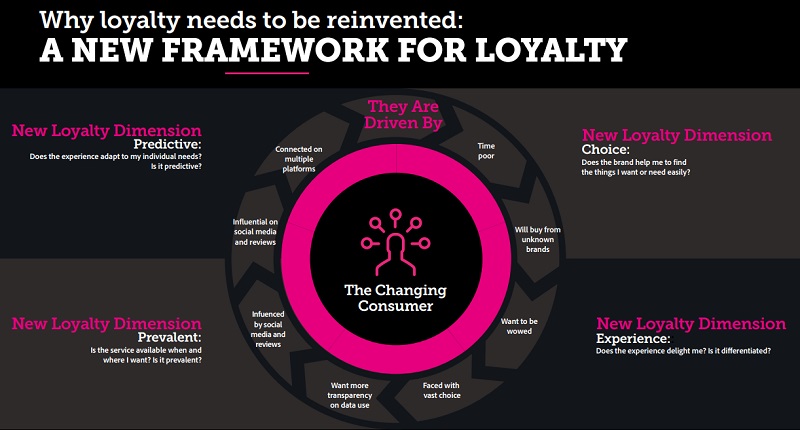Three quarters (75%) of marketing leaders admit they don’t understand changing consumer behaviour, which is having a major impact on business performance, according to a major new study into loyalty.
The full findings, from Goldsmiths University and Adobe, indicates that brands that have been able to adapt to this change commercially outperform those using traditional loyalty measures by as much as 14%.
As part of the research, academics tracked brands across Europe to see how marketers are stacking up against new consumer loyalty measures.
Key outtakes include:
• The majority of firms are yet to take advantage of the scale and precision AI can provide for experiences. Almost two thirds (61%) of consumers said they were loyal to brands that tailor their experiences to them, yet less than a third of marketers are using AI to do so (32%).
• More needs to be done to educate consumers about how brands are using their data. More than three quarters (76%) of consumers say that they want more transparency over how their data is used, however only 44% of marketing leaders say they know how customers feel about this.
• For 62% of consumers, consistency is key to their loyalty, but only 58% of marketing leaders said their business provides a consistent experience between online and offline channels.
• Marketing leaders who are adapting to the changes commercially outperform their rivals by 14%
• Artificial intelligence will drive loyalty, but only 32% of marketing leaders are using it to enhance customer experiences
Based on research with marketing leaders and consumers across Europe, the findings reveal how brands are tracking against a number of new consumer loyalty measures, as identified by the academic study.
At the heart of this is a consumer empowered through digital, who is more self-aware and vocal than ever before. Loyalty is no longer just based on brand affinity, but on the experience the brand delivers. Today’s consumer considers:
• Does the experience adapt to my individual needs? Is it predictive?
• Is the service available when and where I want? Is it prevalent?
• Does the vendor help me to filter choice?
• Does the experience delight me? Is it differentiated?
Garrett Ilg, President of Adobe EMEA, says: “Technology has put vast choice at the consumers’ fingertips, changing the traditional concepts of loyalty forever. The constant disruption brands face today means that they must reimagine their entire customer experience. This study illustrates that the brands that do this, are reaping the benefits of a more loyal, and more profitable, customer base. As a result, organisations need to carefully examine their content and data strategies to become true experience businesses.”
Using data and AI to create loyal customers
Almost two thirds (61%) of consumers report loyalty to brands that tailor their experiences to their preferences and needs. Data underpins brands’ ability to do this and while 65% say their firm adapts marketing to target individual customer needs, the majority are not yet taking advantage of the scale and precision AI can provide. Less than a third (32%) say they use AI to enhance customer experience, even though nearly seven in 10 (69%) say that it has the capability to redefine customer relationships.
Yet the research shows there is work to be done in educating customers on how their data is being used to create the experiences they demand. 44% of marketing leaders say they know how customers feel about the way the company uses their data but 76% of consumers want more transparency on how their data is being used.
Seamless experiences, everywhere
Data also helps brands to better understand where the consumer is at any given moment and deliver experiences that answer to an increasing need for speed. 59% of consumers say this is the most important aspect when making purchases. While marketing leaders believe they are delivering online at least -71% say they make web purchasing convenient and easy – significantly fewer (58%) make all their services available on mobile devices.
For 62% of consumers, consistency is also key to loyalty, but only 58% of marketing leaders said their business provides a consistent experience between online and offline channels.
Dr Chris Brauer, Director of Innovation in the Institute of Management Studies (IMS) at Goldsmiths, University of London: “Over 50 years of brand loyalty research has defined loyalty experiences in a way that only partially describes the experiences of consumers and brands in a world of cultural and digital transformation. Our efforts to reinvent loyalty have revealed that a self-aware and digitally-enabled consumer has emerged – seeking products and services that adapt to their needs. Those companies that can create value by providing respectful experiences that fit into their lives will capture their loyalty”.
Report on how to foster customer loyalty in the digital age in the report Reinventing Loyalty: The New Loyalty Experience
Methodologies
Consumer survey (3Gem Research). Insights from the combination of methods and factor analysis were verified quantitatively through a questionnaire amongst 1,000 representative adults 18 years and older in each of five regions: UK, France, Germany, Benelux, Nordics (total 5,000).
CMO Survey (Vanson Bourne): Organisational questionnaire was completed by 130 senior marketing decision makers and CMOs in multinational organisations (with 3000+ employees) scoring organisational readiness and practices in the dimensions of the new loyalty model. Respondents were from organisations based in the UK, France, Germany, Belgium, the Netherlands and the Nordics and in the manufacturing and production; financial services; travel; retail; and automotive sectors.
*The performance measurement was based on the strength of CMO responses to items measuring, self, prediction, prevalence, and choice; against commercial performance based on CMO ratings of productivity, revenue, and profitability.
Source: www.adobe.com
